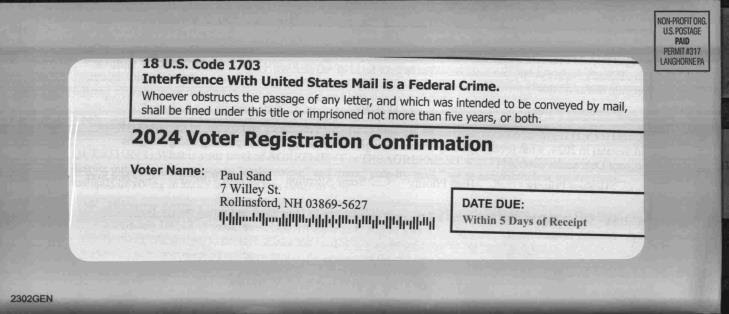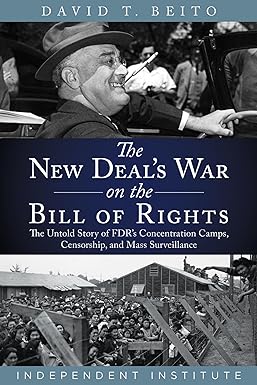I was tempted to do that, but … nah, let's see who's trying to scare their mailing list. "Read this in the next 5 days, or go to the Federal pen. Your choice."
It's FreedomWorks, as it turns out. I've said nice things about them in the past. In 2015 they were useful in quantifying then-Senator Kelly Ayotte's drift away from economic freedom. (A drift that was worse than useless in keeping her seat in the 2016 election.) I liked what their chairman at the time, Dick Armey, had to say in 2008 about some misbegotten privacy-invading legislation.
But Armey quit in disgust back in 2012. And since… meh.
Let them explain (some formatting altered):
Why Your Survey Is Important
Dear Paul Sand:
Thank you for taking a few minutes of your valuable time to…
- Complete this VOTER REGISTRATION CONFIRMATION.
- Sign your PLEDGE TO VOTE in 2024.
- And complete this survey of American taxpayers.
Missing is
4. Send us some money.
Yes, of course they get around to asking for that.
So now it's off to the shredder!
Also of note:
-
Further hint: if you can't spot the sucker at the table, it's you. Phil Gramm and Mike Solon take to the WSJ opinion pages to offer some fiscal guidance: Who Pays Corporate Taxes? Look in the Mirror.
In his call for Congress to repeal the 2017 tax cuts and increase corporate tax rates, President Biden asked: “Are we going to continue with an economy where the overwhelming share of the benefits go to big corporations and the very wealthy?” Rep. Richard Neal, ranking Democrat on the House Ways and Means Committee, said that extending the tax cuts will do nothing but fill “the pockets of venture capitalists and some business owners.” President Obama’s top economist, Austan Goolsbee, said that debates over who pays the corporate tax are “an argument about whether making corporations pay more income taxes would trickle down into lower workers’ wages.”
Further on, Phil and Mike note:
Corporate tax rates, which were the driving force behind the permanent part of the 2017 tax cuts, receive less attention than individual income-tax rates only because Americans don’t understand that corporations don’t pay taxes. A corporate entity is a “pass through” legal structure—a piece of paper in a Delaware filing cabinet. When the corporate tax rate increases, corporations try to pass the cost on to consumers. To the degree that the entire cost of the tax increase can’t be passed on to consumers, those costs are borne by employees and investors. Most economic studies conclude that 50% to 70% of a corporate tax increase not passed on in higher prices is borne by workers, while 30% to 50% is borne by investors.
If you consume, you pay the corporate tax. If you consume and work for a corporation, you pay the corporate tax twice. If you consume, work and invest your retirement funds in corporate equities, the corporate tax rate hits you three times. Democrats call up the image of the greedy robber baron as a personification of big corporations, but when you pull back the curtain, it isn’t the wizard or the robber baron you see but yourself as a consumer, worker and pensioner.
I'm retired, so I'm only hit on the "consume" and "invest" punching bags. The "genius" of the Biden strategy is that the plunder out of my pocket is so indirect.
-
Among the many things that should not be funded by taxpayers… Michael Chapman of Cato goes after a recent target of criticism: NPR Should Not Be Subsidized by Taxpayers. But that's not all, folks:
If NPR were private, receiving no taxpayer funds, like The Nation or NBC News, its coverage and “less diverse” audience would likely raise little concern. NPR could be as woke as it wants or as conservative as it wants. The bottom line is that there is no reason why taxpayers should be forced to fund news organizations.
In the Cato Handbook for Policymakers (9th Edition), scholars at the Cato Institute write, “In a society that constitutionally limits the powers of government and maximizes individual liberty, there is no justification for the forcible transfer of money from taxpayers to artists, scholars, and broadcasters. … Moreover, the power to subsidize art, scholarship, and broadcasting cannot be found within the powers enumerated and delegated to the federal government under the Constitution.”
The same chapter says “Congress should eliminate the National Endowment for the Arts; eliminate the National Endowment for the Humanities; and defund the Corporation for Public Broadcasting.” (CPB’s FY2024 operation budget is $535 million.)
For radio and TV, “the selection process is inherently political,” reads the Cato Handbook. “Why are taxpayers in a free society compelled to support news coverage, particularly when it is inclined in a statist direction?”
Why indeed?
-
Not a replacement for "Dr. Quinn, Medicine Woman". Andrew C. McCarthy is no Trump fan, but he is merciless on one of Trump's many legal nemeses: Alvin Bragg, Election Denier. An excerpt from one of his (many) articles:
We have spent much time on the manifold flaws in Bragg’s prosecution, including:
- A business-records-falsification indictment against Trump that Bragg, the paragon progressive prosecutor, would bring against no one but a political enemy.
- The impropriety that Bragg, a state prosecutor, is purporting to enforce federal campaign law — without a peep of protest from the collusive Biden Justice Department, naturally — in a matter that both DOJ and the Federal Election Commission (the federal agencies with actual jurisdiction over the matter) decided not to pursue against Trump.
- The fact that Bragg is accomplishing this by making up his own version of what federal law requires, again, without any pushback from the feds — although you can only imagine the howling we’d be hearing if this were being done to a Democrat.
- And the fact that this criminal case, mirroring New York attorney general Letitia James’s outrageous civil fraud case against Trump, involves an alleged fraud scheme in which the state can prove no fraud victims — i.e., Trump is charged with falsifying his records with fraudulent intent, but the state is not claiming that anything or anyone, including the state itself, lost a penny.
Any one of these infirmities — and I’ve just hit the main ones — should be enough to explode Bragg’s prosecution, to say nothing of all of them in concert. But in focusing on the trees, we miss the forest: Alvin Bragg is an election denier.
That’s what this case is about. It is an elected progressive Democratic district attorney’s version of “stop the steal” — the fraud that Democrats claim leaves “our democracy” hanging by a thread. Don’t take my word for it. Just read the Statement of Facts, so-called, that Bragg published in conjunction with the indictment.
The classified-document case is probably the strongest against Trump. Bragg is an enthusiastic Trump-hater with unfortunate power.
-
I'm proud to be a cultural appropriator. And so is Martin Gurri, as he writes In Praise of Anglo-Saxons.
This being an age of social justice, I want to recognize the achievements of today’s most ruthlessly marginalized and stereotyped ethnicity: the Anglo-Saxons. In film, television and the news media, the mandatory depiction of the Anglo-Saxon is either as a plutocrat or a hillbilly. The little Monopoly guy with the top hat and the monocle? He’s an Anglo-Saxon. The inbred yokel in “Deliverance” who kills anyone not married to his own sister? An Anglo-Saxon of the worst kind.
By Anglo-Saxon I mean everyone originally from the island of Britain, including Scots, Welsh, Cornish and other assorted Celts who for centuries have roosted on the branches of the vast English tree. Let’s face it: To us non-Anglo-Saxons, from a distance, they all look alike. I also include the Scotch-Irish, who are really Scots who lived in Ireland before they left to improve their lives in Appalachia. But I most certainly do not include the actual Irish: If I were to call the Irish Anglo-Saxons, soon after, I’m certain, the Irish Republican Army would be knocking on my door.
It’s true that the Anglo-Saxons are plutocrats and hillbillies—but they are so much more! Start with sports, the activity that best exemplifies the Anglo-Saxon ethos. Now, it is an irresistible impulse of the human animal to pick up sticks, spheres or both, and play games with them. This has been so in all continents and cultures, from the beginning of time. But only to the Anglo-Saxons did it occur to legislate a game into a sport. They accomplished this by mandating a bunch of arbitrary but unyielding rules (“three strikes and you’re out”) and the usage of words that were sometimes vaguely moralistic (“error,” “penalty”), sometimes weirdly suggestive (“love” for a tied score) and suddenly you had modern tennis, baseball, basketball, cricket, golf, hockey and football, both of the American and the lesser kind.
It's awe-inspring, ackshually.
| Recently on the book blog, one that some regular readers might find of interest: |


![[The Blogger and His Dog]](/ps/images/me_with_barney.jpg)



